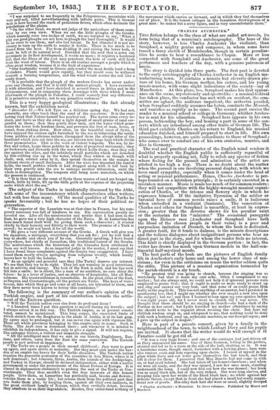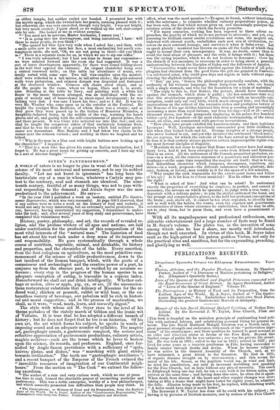CHARLES A.IICHESTER...
Tins fiction belongs to the class of what are called art-novels, its form being that of a musician's autobiography. The hero of the story, however, is less Charles Auchester the violinist, than Seraphael, a mighty genius and composer, in whom some have traced a fancy sketch of Mendelssohn, though in certain peculiar- ities he seems to bear a resemblance to Chopin. More or less connected with Seraphs-el and Auchester, are some of the great performers and teachers of the day, with a genuine patroness of music.
The story is divided into three parts. The first part is devoted to the early autobiography of Charles Auchester in an English ma- nufacturing town. It contains a minute but cleverly-drawn pic- ture of his home, his German mother, his sisters, and his young music-master, with some slight indications of the society—say of Manchester. At this place, too, Seraphael makes his first appear- ance on the scene, mysteriously and spectrelike : a musical festival has taken place, the conductor has met with an accident, the com- mittee are aghast, the audience impatient, the orchestra puzzled, when Seraphael suddenly assumes the baton, conducts the Messiah, and vanishes as rapidly as he came. The second part carries the reader to a musical school or college in Germany, whither /inches- ter is sent for his education. Seraphael here appears in his own person, befriending the boy, and bearing a part in some of the con- certs which are introduced among other traits of German life. The third part exhibits Charles on his return to England, his musical education finished, and himself prepared to start in life. His own proceedings, however, are quite subordinate to those of Seraphael ; who comes over to conduct one of his own oratorios, marries, and dies in Germany.
The real and practical character of the English mind renders it doubtful whether the English public is sufficiently regardful of what is properly speaking art, fully to relish any species of fiction where feeling for the pursuit and admiration of the artist are pitched in too high a key. There is no doubt about the mattes when the pursuit is one involving personal display, with which we have small sympathy, especially when it comes under the head of acting or musical performance. Hence, Charles Auchester is per- haps founded on a mistaken principle ; it is certainly executed in a mistaken manner. Music is made too much of for common readers : they will not sympathize with the highly-wrought musical organi- zation of Charles, or the intense and flowery style in which he expresses himself. If the imitative Byronism of the soldier or baronial hero of common novels raises a smile, it is ludicrous when embodied in a -violinist (Santonio). The veneration of Charles and others for Seraphael is unearthly, at least in expres- sion ; greater than the devotee shows for his peculiar saint or the sectarian for his "minister." The occasional panegyric upon the Hebrew race (Auchester and Sera hael have both the blood of the chosen people in their veins is a poor ancl purposeless imitation of Disraeli to whom the book is dedicated. A greater fault, for it tends to dulness, is the minute descriptions and the tedious dialogues about insignificant persons who bear no direct part in the story, and for whom the reader feels no interest. This fault is chiefly displayed in the German portion : in fact, the writer has drawn too much upon German models in the half-sen- timental half-mystical moods.
The best parts of the book are the pictures of English family life in Auchester's early home and among the lower class of mu- sicians; for even in the criticisms on music the writer seldom quits the stilts. This picture of a musical organization tormented by the parish-church is a sly touch.
"My greatest trial was going to church, because the singing was an wretchedly bad that it made my ears ache. Often I complained to my mother ; but she always said, we could not help it if ignorant persons were employed to praise God ; that it ought to make us more ready to stand up and sing and answer our very beat, and that none of us could praise Him really as the angels do. This was not anything of an answer, but I persisted in questioning her, that I might see whether she ever caught a new idea upon the subject ; but no ! and thus I learned to lean upon my own opinion before, I was eight years old, for I never went to church till I was seven. CM thought that there should be no singing in church—she had a dash of the Puritan in her creed ; but Lydia horrified my mother oftentimes by saying she should write to the organist about revising the choir. But here my childish wisdom crept in, and whispered to me, that nothing could be done with such a battered, used up, asthmatic machine, as our decrepit organ; and I gave up the subject in despair." Here is part of a private concert, given by a family in the neighbourhood of the town, to which Lenhart Davy and lus pupils are invited. It shows that the writer would do well enough if 1.1 Fanatic° could be got rid of. "It was a very large house; and one of the carriages had just driven off as Davy announced his name. One of three footmen, lolling in tbe portico, aroused and led us to a room at the side of the hall, shutting us in. It was a handsome room, though small, furnished with a looking-glass; here were also various coats and hats reposing upon chairs. I looked at myself in the glass while Davy and our tenor gave themselves the last touch, and then left it clear for them. I perceived that Miss Benettc had not come in with us, or had staid behind. She had taken off her bonnet elsewhere; and when we were all ready, and the door was opened, I saw her once inore, standing underneath the lamp. I could now find out how she was dressed: her frock was as usual black silk, but of the very richest. She wore long sleeves, and drooping falls upon her wrists of the finest black lace; no white against her delicate throat, except that in front she had placed a small but really magni- ficent row of pearls. Her silky dark hair she wore as usual, slightly drooped.
• Charles Auchester: a Memorial. In three volumes. Published by Hurst and Blackett.
an either temple, but neither curled nor banded. I presented her with the mystic sprig, which she twisted into herpearls, seeming pleased with it ; but otherwise she was very unexcited, though very bright. I was not bright, but very much excited ; I quite shook as we walked up the soft stair-carpet side by side. She looked at me in evident surprise. " ' You need not be nervous, Master Auchester, I assure you!' "It is going into the drawingroom, and being introduced, I hate: will there be many people, do you think ? ' "She opened her blue eyes very wide when I asked her; and then, with a smile quite new to me upon her face, a most enchanting but sorely con- temptuoua smile, she said, 'Oh, we are not going in there—did you think so ? There is a separate room for us, in which we are to sip our coffee.'
"I was truly astonished; but I had not time-to frame any expression— we were ushered forward into the room she had suggested. It was a sort of inner drawingroom apparently, for there were closed folding-doors in the wall that opposed the entrance. An elegant chandelier hung over a central rosewood table; on this table lay abundance of musk, evi- dently sorted with some care. Two tall wax-candles upon the mantel. shell were reflected in a tall mirror, in tall silver sticks ; the gold-coloured walls were picturelms, and crimson damask was draperied and festooned at the shuttered window. Crimson silk chairs stood about, and so did the people in the room, whom we began, Clara and I, to scruti- nize. Standing at the table by Davy, and pointing with a white kid finger to the music thereon arranged, was an individual with the or- gans of melody and of benevolence in about equal development; he was talking W very Mr. very fast. I was sure I knew his face; and so I did. It was theestley who came upon us in the corridor at the Festival. He
taught the younger Miss Redferns, of whom there was a swarm; and as they grew they were passed up to the tuition of Monsieur Mimndos, a haughtily-behaved being, in the middle of the rug, warming his hands gloves and all, and gazing with the self-consciousness of pianist primo, then and there present. It was Clara who initiated me into this fact ; and also that he taught the competent elders of that exclusively feminine flock, and that he was the author of a grand fantasia which had neither prede- cessor nor descendant. Miss Benette and I bad taken two chairs in the corner next the crimson curtain ; and nestling in there we laughed and we talked.
" ' Who is the man in a blue coat with bright buttons now looking up at the chandelier?' I inquired.
''That is a man who has given his name an Italian termination, but I forget it. He has a great name for getting up concerts, and I dare say will be a sort of director tonight.' "



























 Previous page
Previous page